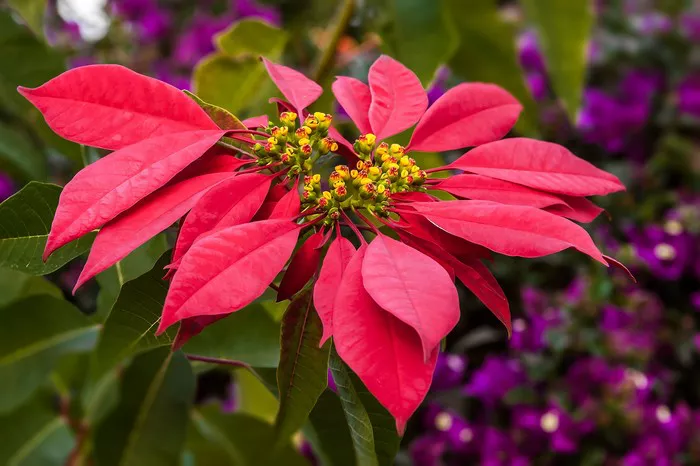Poinsettias (Euphorbia pulcherrima) are synonymous with the festive season, adorning homes, offices, and public spaces with their vibrant red, white, and pink bracts. These plants are popular during the holidays, but they come with a longstanding reputation for being toxic to pets, particularly dogs. This article aims to delve into the toxicity of poinsettias, examining scientific evidence, understanding the nature of the plant, its effects on dogs, and offering guidance on what to do if your dog ingests any part of this plant.
The Myth of Poinsettia Toxicity
The belief that poinsettias are highly toxic originated from an incident in the early 20th century when a child was reportedly poisoned by the plant. This case, which was later debunked, led to widespread misinformation about the plant’s toxicity. Over time, research has shown that poinsettias are not as dangerous as once thought. However, this does not mean they are entirely harmless.
Understanding Poinsettias
Botanical Characteristics
Poinsettias are native to Mexico and belong to the Euphorbiaceae family. They are known for their colorful bracts, which are often mistaken for flowers. The actual flowers of the poinsettia are small, yellow, and located at the center of the bracts. The plant contains a milky latex sap, which is a key factor in its toxicity.
Components of Toxicity
The primary concern with poinsettias is their milky sap, which contains compounds called diterpenoid euphorbol esters and saponin-like detergents. These compounds can cause irritation to the tissues they come into contact with, such as the skin, mouth, and gastrointestinal tract.
Effects of Poinsettia Ingestion on Dogs
Clinical Symptoms
If a dog ingests parts of a poinsettia plant, they may exhibit a range of mild to moderate symptoms. These symptoms typically include:
1. Gastrointestinal Upset: Vomiting, drooling, and diarrhea are common symptoms due to the irritation of the gastrointestinal tract.
2. Oral Irritation: Dogs may experience drooling, licking, and swelling of the mouth and throat due to the irritating nature of the sap.
3. Skin Irritation: If the sap comes into contact with the skin, it can cause redness, swelling, and itching.
Severity of Symptoms
The severity of these symptoms largely depends on the amount of plant material ingested and the size of the dog. Generally, symptoms are mild and self-limiting, resolving on their own without the need for medical intervention. However, in rare cases, dogs with pre-existing health conditions or those that ingest large quantities of the plant may experience more severe reactions.
Scientific Evidence and Studies
Research Findings
Several studies have been conducted to determine the toxicity of poinsettias. Research by the American Society for the Prevention of Cruelty to Animals (ASPCA) and other veterinary toxicology sources indicates that poinsettias are only mildly toxic to dogs. For instance, a study published in the journal “Toxicology” reviewed numerous cases of poinsettia ingestion in dogs and found that none resulted in severe or life-threatening symptoms.
Expert Opinions
Veterinary toxicologists and experts consistently reiterate that while poinsettias are not harmless, they are far less toxic than many other common household plants. The Pet Poison Helpline states that the plant’s toxicity is overstated and that poinsettias are generally safe to have in homes with pets, provided that some basic precautions are taken.
Preventing Poinsettia Poisoning
Safe Placement
To prevent accidental ingestion, it is advisable to place poinsettias out of reach of pets. High shelves, hanging baskets, or rooms that are off-limits to pets can serve as safe spots for displaying these festive plants.
Alternative Decorations
For pet owners who are particularly concerned, there are plenty of alternative holiday decorations that pose no risk to pets. Artificial poinsettias, for example, can provide the same aesthetic appeal without the associated risks.
Educating Family and Visitors
Ensuring that everyone in the household is aware of the potential risks associated with poinsettias can also help prevent accidental poisoning. This is especially important during the holiday season when homes may have more visitors and increased activity.
What to Do If Your Dog Eats a Poinsettia
Immediate Actions
If you suspect your dog has ingested part of a poinsettia, it is important to act promptly:
- Remove Access: Ensure that your dog cannot consume any more of the plant.
- Rinse the Mouth: If possible, rinse your dog’s mouth with water to remove any residual plant material and sap.
- Observe Your Dog: Monitor your dog for any signs of distress or symptoms such as vomiting, drooling, or diarrhea.
When to Seek Veterinary Help
In most cases, poinsettia ingestion will result in mild symptoms that resolve on their own. However, veterinary attention is necessary if:
- Symptoms persist or worsen after a few hours.
- Your dog shows signs of severe gastrointestinal distress, such as persistent vomiting or diarrhea.
- There are signs of an allergic reaction, such as difficulty breathing, swelling, or hives.
Treatment Options
Veterinarians may recommend treatments to alleviate symptoms, such as:
- Anti-nausea Medication: To control vomiting.
- Fluid Therapy: To prevent dehydration from vomiting and diarrhea.
- Antihistamines: To manage allergic reactions if they occur.
Conclusion
While poinsettias are not the deadly threat to dogs that they were once believed to be, they are not entirely harmless either. Understanding the mild nature of their toxicity and taking preventive measures can help ensure that your festive decorations do not pose a risk to your furry friends. By staying informed and vigilant, you can enjoy the beauty of poinsettias during the holiday season without compromising your pet’s health and safety.


